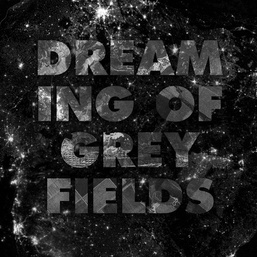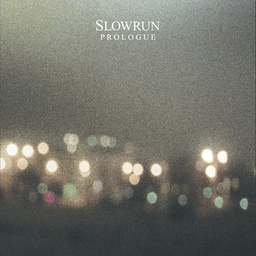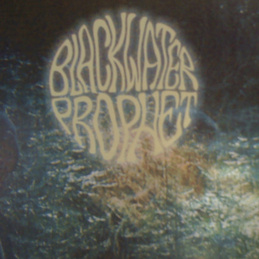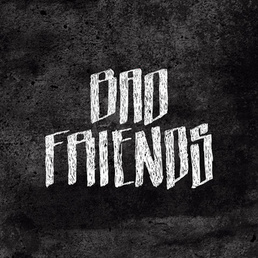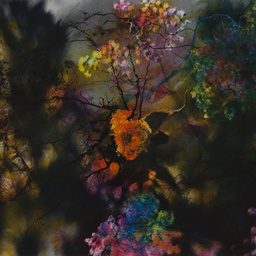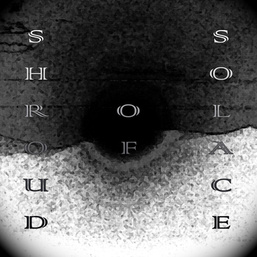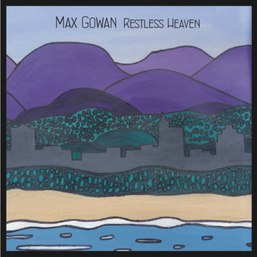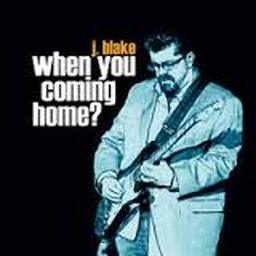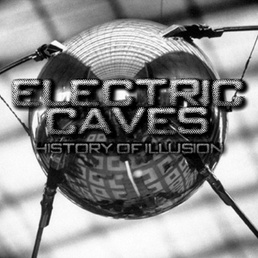|
Hailing from Toulouse, France, Dreaming Of Grey Fields is the combined efforts of Anthony (guitars), David (bass), Michaël (guitars, keyboards, vocals) and Maia (lead vocals) - (sorry I don't have last names) that recently released an exceptional self-titled six-song EP Dreaming of Grey Fields. It’s honestly frustrating to me that music this good is going basically unnoticed. They have a hundred Facebook likes for christsakes. This music is a delicate almost perfect balance between shoegaze, pop and electronic music. The guitars are usually drenched in reverb but they also create hazy dream-like atmospheres while the organic bass and electronic drums hold it down with an effective low end. The vocals are irresistibly infectious but also are coated with melancholy. Maia has an original sounding voice that avoids clichés as it resonates with heartfelt sentiment. Suffice it to say every song on the EP feels unique within itself but also connected to the overall vibe of the EP. A task that many try to accomplish but few attain. The EP opens with “Palomino” that crackles and pops with kinetic energy. An arpeggiated synth cascades back and forth between a delayed guitar while Maia delivers her lines. Once the chorus enters she repeats the same lyrics but dear god is it catchy. Great song to start the EP with. “Splendour” drips with waves of white noise and is slow but effective. The vocals are emotionally heavy and hit you whether you want it to or not. The band goes three for three with “Secretly A Horse,” which builds on their strengths but is also more percussively heavy than the previous songs on the album. Don't pass up “Wardonia” or “Schwizzie” but if you have no patience and want to hear the best the band has to offer then play “Cast.” The first half of the song is pure pop goodness with vocal harmonies that I was immediately humming along with while the second half is a gooey, beautiful mess of white noise that has comparisons to My Bloody Valentine and M83. The songs are there but so is the production. Everything is where it should be and the recording sounded professional. All I have to say is that is an exceptional debut that showcases a band I hope to hear a lot more from.
2 Comments
Post-rock could be viewed as our generation's prog. It aims to push the basic building blocks of rock n’ roll - electric bass, guitar and drums - into symphonic territory. Words are abandoned as song structures are lengthened into sprawling, spiraling dream works of Catherine Wheel guitars and marching band percussion. Like prog, post-rock is often accused of being vaguely pretentious. Just because you have an elaborate concept or are learning to play in a different time signature does not mean you're pretentious. Do people call the Talking Heads pretentious? And, even if it is, so what? This drive, this pretention, pushes the music ahead into a refined state. That's the feeling I've always had from post-rock, and from any style of music that rubs against heavy metal in any way, is that the musicians wanted to learn to play. Why else would they abandon lyrics entirely and feature drastic key and tempo shifts, as Slowrun does at least twice in the first track alone? The music - the twining lines of dual guitars, kicking drums and throbbing bass, must be the point. The result on Prologue, the debut from Finland's Slowrun, is a kind of electrical symphony with glissandi lead guitars playing the role of first violin where the score is conducted by sine-width pulses and held breaths. Classical music has never embraced electricity or amplification, wholesale, as appreciators try and keep it as it were in 1500. I'm glad the pure form exists but this seems to be a missed opportunity, particularly in the realm of sustained tones and sonic sculpting. All of these things and many more are possible with the rock band formula but it seems as if, as soon as someone is holding a Jaguar or a Rickenbacker, it is automatically judged by the dictates of rock n’ roll. As if the musicians didn't already have enough of a compulsion to just emulate what they'd heard before, to stay safely within boxes and win fortune and fame. But some people go further. Some people have more to say. This is when things get good - when artists are not prescribing to pre-set forms but striking out on their own with something to say. Because while Prologue may be a stunning example of a post-rock record, it could also be a soundtrack for a fireworks spectacle over Versailles, a sonic diary of falling in and out of love or just an approximation of floating in space. Perhaps Prologue's individuality comes from its genesis, where member Mika withdrew from the world during 2010/2011, and wrote some demos, which would come to be fleshed out to become this album. Mika was obsessed, driven by a pure and clear vision in his mind. This clarity of vision almost proved to be too much for the recording process as the real world sounds struggled to match the idealized tones in his mind. In the end, they did the best they could and created a record that is ambitious and grandiose while still sounding intimate and personal. It doesn't have as much of an over-arching flow, rather being comprised of six smaller symphonic works, each with its own peaks and breakdowns. It is similar to the long-form crescendo rock of Mogwai or Explosions In The Sky but I feel like the climax comes a little earlier in the games, and leaves more room for graceful elaborations and explorations with a tiny bit of a tail. The most joyful aspect of Prologue is the guitars. While a similar tone is employed throughout the record, a mostly-clean starburst chime with a bit of echo and delay - which can make things a bit same-y at times but it's still thrilling to watch the patterns dance and weave around one another like hummingbirds or fireflies. Very talented guitar playing with memorable melodic lines and great production. Nice use of stereophonic space. Also honorable mention goes to the drumming with powerful syncopated jazz beats, that are deft and light but still pound like a granite avalanche. The drumming is always a highlight of a post-rock record and this is no exception. Some may feel that they've heard Slowrun before; that their chorus of echoes and constellation guitars has been done. That would be a mistake because the glory is in the details, in the space between notes. There is a viscerality - a tracer of dreams, in the glowing nimbus around the guitars. And the production is equipped to capture the magick, which, all in all makes for a winning combination. Instrumental, symphonic rock n’ roll has been getting interesting again lately with new and noteworthy records from Mogwai, Thee Silver Mt. Zion, the mighty Mono and more. The time has come to reconvene and reconsider the state of wordless music, which is some of the dreamiest sonic poetry out there. Slowrun is a fine purveyor of the classic sturm and drang and is worthy of your admiration. There's a moment in the film “Walk The Line” about the life of Johnny Cash where someone asks him, "They say your music is slow as a train, but sharp as a razor," to which The Man In Black responds, "We'd probably play faster if we could." Sometimes it's good to play it slow. There is a tendency, especially in metal music to ramp it up, to play double time and display your pyrotechnic virtuosity. But, like sex, the best rock n’ roll is slow and sensual, taking its time and feeling the nuances. On their debut self-titled recording Blackwater Prophet, Spokane, Washington's Blackwater Prophet keep it in the pocket, playing an elegant brand of doomy psychedelic stoner rock that is patient and refined, bringing to mind classic doom merchants like Black Sabbath, as well as modern purveyors of blues rock and metal minimalism like The White Stripes, Kyuss or The Black Angels. By keeping the tempos in the mid-range, Blackwater Prophet is able to stretch out letting their reverb and echoes fill the space to create a mood that is both rocking while still being mellow and contemplative. They create a mood that permeates the environment like black candles and incense allowing for the possibility of the miraculous. "Down By The Riverbed" starts the trance off early with twanging acoustic guitars that sound like Neil Young playing "Down By The River" with African trance rockers Tinariwen. Right away, the visionary mood is established and spliced with some rustic vibes, sounds like some druids gathering in a secluded place, to open a portal. From the first track, you can hear the advantages of Blackwater Prophet's slow stateliness, as the guitar lines take their time; guitars ring out and chime in slowly unfurling melodies while the bass creates the ground beneath your feet with a simple and effective two-note groove that brings to mind John Paul Jones' grind on Led Zeppelin's "When The Levee Breaks.” When the simple but awesome wah solo comes in 2/3 of the way through your patience is rewarded and Blackwater Prophet's logic begins to make sense. This is not music that shouts for your attention but rather invites you to listen and join in. Trance rock visionaries and psych warriors will be gibbering for this one, for those that take the time to delve into the vinyl grooves (metaphorically, as this is only available on digital and CD, so far). This method seems to encapsulate the ethos of Blackwater Prophet. The songs that make up this self-titled debut were written over the span of three years and recorded during the summer in 2014. They have already opened for a number of huge psych names like The Meat Puppets, Pontiak and Rose Windows, and this album was released to a nearly sold-out audience. They've clearly built a following and took their time in constructing their inaugural statement. This is a clear case of substance over hype; a band putting their time into writing songs and mastering their instruments rather than constructing Internet marketing strategies. Born from the ashes of house shows and dingy bars, Blackwater Prophet is a real rock n’ roll band, the kind worthy of celebration. The mood is not all doom 'n witchcraft as the band frequently steps up to a romantic '50s twang like on "Kill 'Em All" or "Wicked Ways" where the opiated blues rock side of their personality comes out sounding like an outtake from David Lynch's haunted roadhouses in Twin Peaks. Clearly, Blackwater Prophet is not a one-trick pony, not merely "another stoner band," but rather archaeologists of downtrodden grooves. You can hear echoes of classics like The Allman Brother's "Whipping Post" on "Poor Man," just going to show the band has done its homework, and is drawing its riffs from all over showcasing an alternate history of visionary American music across country, the blues, folk, stoner rock and doom metal. If you like slow metal that caresses as much as it pummels, if you rejoice at flying saucer acid rock phase and wah solos or bass that slowly undermines your mind with its pummeling tumult, you have come to the right place. Blackwater Prophet has attitude and edge but still invites you to take part in their incantation. They welcome you into their world. It's fun here, and interesting, even if it is spooky and terrifying. It's worth traversing the shadows for lights this bright. Become A Fan Des Moines, Iowa's Bad Friends play smart, literate guitar-centric indie rock, that has mainlined the message of late '90s and early '00s hardcore, emo and progressive art rock, distilling what's great and ditching the rest. With album opener "Tourniquet" on their self-titled EP Bad Friends they come across as a jazz-inflected prog punk band, similar to the best emo-indebted music from the early '00s, like At The Drive In or The Blood Brothers and we are reminded of how much is possible when punks decide to learn to play. The drums play an impossibly fast shuffle-skip-beat, while clean guitars rage and strum in the margins, breaking the wall of distortion. "Tourniquet" also brings to mind the recently reformed The Dismemberment Plan, and has a similar blend of twitch, flail and groove, and brings out the caustic wit of that era of indie rock; super sharp, nearly cutting, while still being heartfelt. That was the potential and the promise of the era - music could be edgy and raucous, but still be romantic, or heroic. It was the sound of too-smart kids, sequestered away in nowhere, hunkering down and mastering their guitars and drums, creating treasuries of Art, trying to survive whatever backwater suburb they were stuck in. The music benefits from this, as punk rock, as energy and vitality, is evergreen and important. It is quite simply the sound of youth revolt condensed into cheap distortion pedals and power chords. It's the sound of not being willing to wait, of feeling like you have something to say even if you're not equipped to say it. The problem is that once most people find punk, it is in its cartoonish variation, and people are too content to merely mimic the revolutions of the '70s, as if they were British youth with liberty spikes, on the dole. This is just not reality for most of us. We need a timelier punk that we can all relate to. The early '00s indie/emo style has elements of hardcore punk, jazz rock and extreme styles, like grindcore or noise to create a sonic stew more in line with our daily lives, listening to many, many different styles of music. This means there is the real potential to cross over, as Bad Friends won't appeal only to one mood or one type of person. After the upbeat thrash attack of "Tourniquet" things take a surprising turn for the lovely and stays that way. The rest of this short EP features high, nearly operatic vocals, pure and heartfelt, while clean guitars loop and lope in patterns of interlocking harmonies. As with most heroic music, the success comes from the vocals. Eric McCoy's lead vocals are clean, clear, bright and powerful. He hits the high notes effortlessly, and carries the epic heroic vibe. It is, quite simply, the difference between bands like Radiohead or Tool, who both feature vocalists that can pull off the high notes convincingly, and a whiny, tinny indie band (I want to reference Dashboard Confessional, but it always my instinct to reference that band when discussing annoying, grating emo punk). I feel like the abrasiveness prevents a listener from falling completely under a song's spell. Of course, its practitioners would argue that is part of the point. It's music that's meant to provoke and possibly antagonize. Still, it's hard to listen, or let in, someone who is constantly attacking you. Bad Friends manage to maintain the energy and edginess, without turning anyone away at the door, by subsuming the harsh edges in cumulus formations of windswept guitar, and gorgeous vocals. Without the grating element, the rest of the instruments are free to range and explore, to sell their qualities without fear. The guitars are minimal and perfectly placed, sounding like sunlight on the tops of clouds as on the album closer "Three" and reminds us of that time when post-rock was infusing over into other styles of rock 'n roll and it seemed like anything was possible. Music could be beautiful, but still muscular. Here was music that proved you could be emotional and still be strong. Metal for mathematicians and punk for Ph. D.'s. That's not to say that there's anything wrong with those styles in their more primitive forms, it's just that music like Bad Friends has a wider emotional vocabulary, and is more honest and representative of real life. The Bad Friends EP is the culmination of two years of work. The band is doing a major push across the Midwest to celebrate its inception. So keep your eyes peeled on your local listings and let's wish luck on this group of smart and sensitive axe wielders. Hip-hop and electro have a logical overlap in their often-looped rhythm sections and in their production. For some this may seem like a long bridge to connect the genres, but Champion Sound by A. Sarr (the stage name of Andrew Sarrion) exhibits how natural blending the two can be. Don't get me wrong: Sarr's is a strange sound. Though what's been mentioned already serves as a common thread throughout the five-track EP, Sarr draws some diverse electronic soundscapes splashed with some outside influences as well. There's an acoustic strum at the heartbeat of “Artkarma” that rises and falls beneath the continuous warmth of glowing synths and Sarr's slow-drawn vocals. “20Sided” pulses like a trance song, switching between the subdued verses before surging into momentous combination of an uplifting synth line and a clipped, replayed vocal piece. “Drippy” comes the closest to being a straightforward pop song, at least at the start: a mechanical beat and thin-sounding guitar riff take lead over light electronic elements as Sarr begins singing. But things build as we move further into the song, and soon bursts of electro goodness rise above everything else, even the vocals, and refuse to ebb away until the track ends. The defining feature of Champion Sound is how every song transforms at one point or another. And while there are elements of trance, house, hip-hop and other genres at work, nothing is a constant. This is usually done by adding more layers onto a piece rather than completely changing what it is. The opener, “prettylites” does this the most despite being the shortest of all the songs. It's a bit overwhelming at first, particularly when you have two vocal bits going in two different directions. If you're in it for the lyrics then you're forced to pay attention to catch everything, but at the same time if that is the case then I feel like you're missing the point in a way. Champion Sound is a textural experience, something to be heard through a pair of headphones and to get lost in. The meaning of the words are in my opinion less important than how they are delivered, and be it through singing or rapping (a trick used a handful of times) there's almost a weariness to Sarr's delivery that causes his voice to blend nicely into everything else. Two guests are credited on the album. The first, Frank Grimesz, took over production for “prettylites” perhaps explaining why it's such a departure from the rest of the EP. The other is Naomi Bowler, who sings a large part of “Sensiblero.” It's a nice pairing: whereas Sarr's voice carries an ethereal quality to it, Bowler at times almost has a sense of urgency, especially when the two sing the chorus together. There's no one label that fits Champion Sound perfectly. Sarr himself describes it with a slew of genres (just a few: electro pop, future R&B, house). I suppose it would be fair to call it electronic music since that's how every song is constructed but at the same time I worry that does too much to put the EP in a box. There are so many sounds and styles here that it must be heard to be understood. There isn’t too much information out there about Shroud Of Solace. I know it’s a solo project and the artist hails from Florida. I also know that the initial idea was to make a depressive black metal album that according to the artist turned to hard rock/goth music. I personally would love to hear a black metal album like that of Sunn O))) but what are you going to do. The most recent release, and to my knowledge only release, by Shroud of Solace is Acclimation, which revolves around distorted guitar, drums, vocal and a bass that is barely audible. My first impression and ultimately what I felt as I got deeper into the material is that the artist is at the embryonic stage of his creative development. That’s not a bad thing; it’s just kind of what it sounds like. There were a couple of things that indicated that to me. The songs while showing some definite talent from the artist are fairly limited in their scope and scale. They revolve around basic guitar chords and repetitive drum patterns. On top of that the songs bleed into each other and it takes three to four spins for the mind to start finding real separation. I’d say the strongest element of the songs was the vocal work. He has a voice that works well with the music. It’s dark, bit mysterious and full of dread-like melancholy. That being said I wish his vocals were more present in the mix. They often felt a bit too buried and I couldn’t discern a thing he was saying. One of the reasons for this is because the mixes suffer from the most typical issue present in DIY projects - low-end allocation. You’ll notice that you will have a hard time hearing the bass and the kick drum on this album. This is because it is occupying the same frequencies that also end up masking the vocals. There weren't any songs that were duds or even missteps. Shroud of Solace is fairly consistent with his writing and if you like one song you will undoubtedly enjoy them all. A couple that stood out were “Tortured Story,” “Mercy is Gone” and “Into Finality.” Shroud Of Solace may still have a ways to go to compete with the best metal available today but everyone's gotta start somewhere. Max Gowan started learning guitar at eight years old, studied jazz and theory and at fourteen started writing his own music. He is now seventeen years old and it is evident on his debut release entitled Restless Heaven that he is probably better at playing guitar than you are. He has some serious skills but they aren’t always displayed because the album revolves around a lone guitar and vocals. If that's your only instrumentation you are going to be forced to play chords most of the time. On his Bandcamp page, Gowan says his influences run from Elliott Smith to The Tallest Man on Earth and maybe even a little John Mayer. To his credit his first two influences are amazing guitarists and songwriters and let’s just hope Gowan forgets about John Mayer as he gets a bit older. The songs on this album luckily don’t sound too derivative of any of those artists but it does suffer from things that are typical with songwriters who are this young. Let’s get this straight that Gowan has a lot of things going for him, He can sing, he can play some amazing guitar and he is finding his way with songwriting. The main issue with the songs is that there is little here that will differentiate him from the slew of above average sensitive singer/songwriter types. His songwriting and delivery permeates within the cloud of mainstream accessibility but it is not distinct enough to incite the interest of hipsters. The most likely scenario here is that his music as of right now may get lost in the endless stream of stiff competition. There is little point going through these songs individually as there isn’t too much separation between them and they can be talked about collectively. Gowan veers towards melancholy but not the “I want to slit myself dread” type. It’s a tight balance and I like the general vibe of the music. More Elliott Smith than The Tallest Man On Earth. Being as young as he is it sometimes take a bit of time for a songwriter to develop their own style. It takes life experience, knowledge, and is something that can’t be rushed. I obviously can’t say for sure but I think this will be the case. Overall, Gowan has a surplus of talent for any age. The fact is that he is seventeen years old and time is on his side Every week we mention a couple of artists that are worth your time to check out that were not featured in our weekly reviews. Artist Album Rating Moonsign Start Anywhere 3.7 The Lock City Thieves The Devil And Bad Decisions 3.6 Blood & Banjos Blood & Banjos 3.7 The Brothel Sprouts Good Enough 3.8 Augustus The Common Collapse 3.9 Brazilian Money Brazilian Money 3.9 Jessica Chase Coming Down 3.6 Oceans Black Oceans Black 3.3 Hoarse Hoarse 3.8 Though When You Comin' Home? is J. Blake's solo debut, it's hardly his first outing. Previously he's founded two other bands (Roadkill Breakfast and Stiletto Wheels) and has played his guitar both as lead and as a solo act throughout the New York area. So it's safe to assume going in that he knows what he's doing musically. For When You Comin' Home? he's focused his efforts solely on the blues genre and rounds out his sound with a four-piece backing band. In the grand tradition of the blues, there are a good number of covers offered up here. Blake and the band take on the Howlin' Wolf classic “Spoonful” and do an excellent job of presenting it in a different light. They go against the grain of the original by framing it more as a beatnik jam: Blake sings in a cool whisper as dense drums carry the track with a simple beat. The keyboard also takes a prominent role, accounting for much of the additional minute in the song's run time, mostly during the intro. Other covers are more subtle in their differences. “Honey Bee” (Tom Petty) falls very close to the original in terms of sound. “Headed Out to Vera's” (John Pizzarelli) departs from the lounge original mostly in tone: Blake's voice, with just the slightest rasp to it, combined with more focus on the guitar work than the original, places the song firmly in a truck-stop jukebox. The Zepplin standard “Rock and Roll” sounds much brighter, having brought the keys high up in the mix. J. Blake and his band make good use of fundamental blues structures throughout the album. Where the band makes their mark is in atmosphere. The five-and-a-half minute title track is how someone like I, who has only a basic familiarity with blues, pictures the genre: a slow, expressive, at times sparse and at others bursting short story. There's lots of repetition in the lyrics, but as Blake continues to “wonder when you comin' home” the desperation of the words increases without overtaking everything else. Indeed, the backbone of the song remains the music itself and here we get some great riffs and fills to bridge the gaps between lines. “Rocking Chair” is lyrically quite brief, allowing for the band to flex their technical prowess. Starting early in the second minute, a spiraling guitar solo plays for over half a minute and before trading places with a Hammond-tinged keyboard before returning to Blake's vocals and the song's steady pace. The album remains solid throughout with the only weak link being the previously mentioned “Honey Bee” cover. It would have been nice to hear more out of the backing players, particularly in the early half of the record; I can hear the keyboards and bass in the mix but there are times when they're buried just a little too deep. Then again, it is Blake's record, so it only makes sense that the guitar playing would take the lead. These days electronic music has become so easy to make via a decent computer that even a stay at home mom can earn her associates degree in EDM. And though this may sound like a joke, which of course it is, it is also a blunt reality. This is not to say that making electronic music is easier than making music with live instruments. It may perhaps be even harder. For as all true fans of electronic music know, the genre is rather large and has multiple sub-genres and within those sub-genres there are still more sub-genres and so on and so forth so much so that it resembles the Darwinian classification system. The artist in question here is Tom LaSala, who makes post-industrial psychedelic music under the name Electric Caves. His latest release History Of Illusion touches on many issues which have been a great concern to many Americans over the past few years, mainly the war on terror, the occupy movement and the larger concern for where the world is heading in general, and the concern that where it is heading is toward a post-apocalyptic future. The History of Illusion liner notes carry the quote, "The warning is that unless the course of history changes, men all over the world will lose their most human qualities, will become soulless automatons and will not even be aware of it." Yet darkness and post-apocalyptic warnings aren’t just some shtick Electric Caves is using to try and build up a sense of mystery behind the music. LaSala explains that after the release of 2011’s Solace Furnace Transformation an album that “cracked into diverse homes from within government whistleblowers, environmental groups, anarchists and the entheogen community alike.” And that “upon networking within those communities, Electric Caves has been invited as an artist to participate in Horizons: Perspectives On Psychedelics, Hour Of The Time’s East Coast Researchers Conference, Occupy Wall St. NYC’s Think-Tank, The NYC Anarchist Book Fair, and the distressed rust-belt town of Braddock, PA.” The opening track “Oversocialized” is cold and uses a blend of deep dark synths that reverberate slowly and eerily and intertwines them with lighter, wispier sounding synths and later incorporates haunting machine-generated vocal growls. The pace begins to pick up on “Visualize Industrial Collapse” on which the classic industrial oil drum echoed beats are heavily pounded out in a tribal styled rhythm like hammers against hot iron. As the song progresses a head bobbing electric electric guitar riff bleeds in adding a much-needed human dynamic. The track “War on Terror” opens with a sample of the character Howard Beale’s rant from the movie Network and also a looped sample of President Obama saying, “How is the war on terror won?” It is by all means both catchy and poppy, though also very smart. “Lawful Levitate” is the most danceable track with up-tempo hollow and industrial drum beats, icy sounding synths and a sample from the television show “True Detective.” The last track, “Pacifier” opens with a bit from a George Carlin routine about how the world is owned by big business and then moves slowly into cold synth sounds and bits of bongo-styled drumbeats. Just past the five-minute mark a quietly strummed acoustic guitar comes in and LaSala begins to sing softly bringing the album to a strange close. History of Illusion is an often cold and desolate sounding record, though it also has moments of classic and catchy electronic beats and loops. However it is likely that many people who are politically unconscious or for whom the world of electronic music is not something they gravitate towards will find History of Illusion a disturbing and ear shattering manifesto created by a crazy person, much like the clean cut hard working Americans of the sixties dismissed the message of peace and love that the hippies were trying to preach. Though had they listened then History of Illusion never would have been made. Perhaps history is meant to repeat itself, if solely for the purpose of making art. |
Critique/insightWe are dedicated to informing the public about the different types of independent music that is available for your listening pleasure as well as giving the artist a professional critique from a seasoned music geek. We critique a wide variety of niche genres like experimental, IDM, electronic, ambient, shoegaze and much more.
Are you one of our faithful visitors who enjoys our website? Like us on Facebook
Archives
July 2024
|

